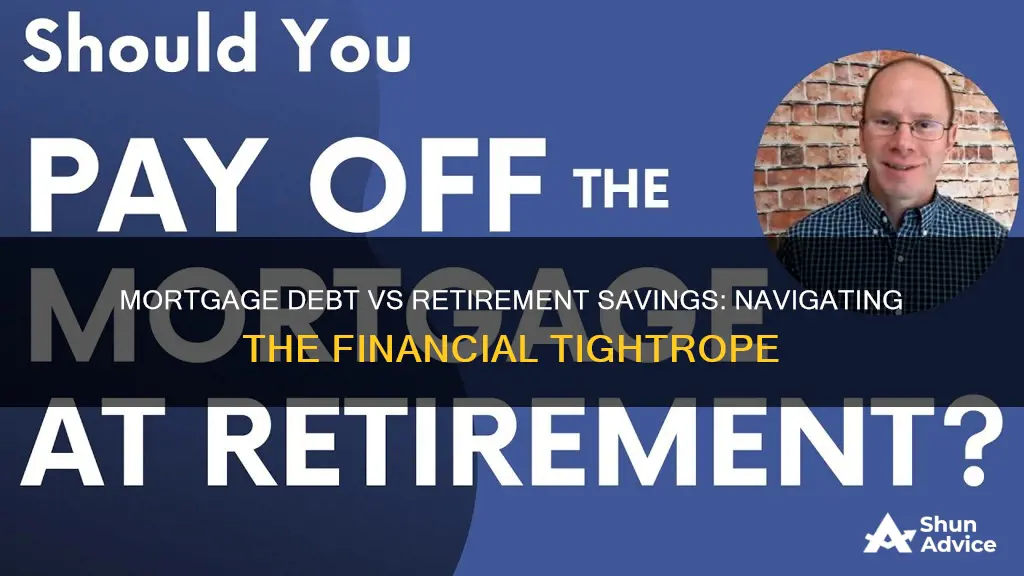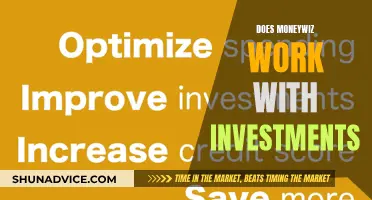
Paying off your mortgage or investing for retirement is a difficult decision that many people face. Both are worthy goals, but which one should come first? Well, that depends on a number of factors, including your financial situation, risk tolerance, mortgage rate, and expected investment returns.
Paying off your mortgage early can save you thousands of dollars in interest and give you peace of mind by eliminating debt. On the other hand, investing for retirement early on can take advantage of compound interest and potentially earn you higher returns, especially if you invest in the stock market.
So, should you pay off your mortgage or invest for retirement? The answer may lie in a combination of both strategies. Many people choose to pay down their mortgage while also investing, ensuring progress towards both goals. Additionally, your decision may depend on your life stage and how close you are to retirement. If you're in your 20s or 30s, starting to invest early and taking advantage of compound interest may be a good option. However, if you're approaching retirement age, paying off your mortgage and eliminating debt might be a more conservative choice.
What You'll Learn
- Paying off your mortgage early can save you thousands in interest
- Investing in stocks or similar can offer higher returns than paying off your mortgage
- Paying off your mortgage can give you peace of mind
- Investing in retirement funds can increase your future wealth
- Paying off your mortgage or investing depends on your risk tolerance

Paying off your mortgage early can save you thousands in interest
When you take out a mortgage, your monthly payments are split between the principal (the amount of money you originally borrowed) and the interest (a fee charged by the lender for the service, calculated as a percentage of the principal). During the first few years of your loan, most of your payments go towards interest. As you pay down the principal, you owe less in interest, and a larger percentage of your payments goes towards the principal.
By making extra payments towards your principal, you can reduce the amount of money you pay interest on before it accrues. This can knock years off your mortgage term and save you thousands of dollars.
For example, let's say you borrow $150,000 to buy a home at a 6% interest rate with a 30-year term. By the time you pay off your loan, you'll have paid a total of $173,757.28 in interest in addition to the $150,000 principal. Now, let's say that you pay an extra $100 every month towards the loan. At the end of the term, you'll have paid a total of $128,170.57 in interest – a saving of $45,586.71. You'll also pay off your loan 81 months earlier.
Paying off your mortgage early can be a good idea if you already have enough money to cover emergencies. It's recommended to have 3-6 months' worth of household expenses in liquid cash before focusing on paying off your mortgage early, as it's much more difficult to take money out of your home than a savings account.
Additionally, if you have other high-interest debt, such as credit card debt or student loans, it may be more financially beneficial to focus on paying off those first, as they often have higher interest rates than most mortgages and accrue interest faster.
Things to Consider Before Paying Off Your Mortgage Early
Before making extra payments towards your mortgage, there are a few things to keep in mind:
- Prepayment penalties: Some lenders charge a prepayment penalty if you pay off your mortgage early. This is usually a certain percentage of the interest you would have paid. Prepayment penalties typically expire a few years into the loan, so check with your lender or review your mortgage contract to understand their policy.
- Opportunity cost: Any money that goes towards your mortgage early isn't being invested elsewhere. If you have a low mortgage rate, it may make more financial sense to invest your money where it has the potential to earn a higher rate of return.
- Tax deductions: Mortgage interest is tax-deductible, so by paying off your mortgage early, you may miss out on tax deductions.
- Liquidity: The money you put into your mortgage becomes illiquid, meaning it's not easily accessible. If you need cash for a financial emergency, you may have to sell your house to access the money.
Final Thoughts
While paying off your mortgage early can save you thousands in interest, it's important to consider your individual financial circumstances, risk tolerance, and financial goals. Consult a financial advisor to help you assess your finances and determine the best course of action for your situation.
Investments: Hold, Sell or Diversify?
You may want to see also

Investing in stocks or similar can offer higher returns than paying off your mortgage
While investing in the stock market can offer higher returns, it is important to remember that it also comes with higher risks. The stock market can be volatile, and there is a risk of losing some or all of your money. On the other hand, paying off your mortgage early can provide a guaranteed return in the form of interest savings.
Additionally, the decision to invest or pay off your mortgage depends on various factors, such as your financial situation, the interest rate on your loan, and your risk tolerance. If you have a high-interest mortgage and some emergency funds, it may be better to pay off your debt first. However, if you have a low-interest mortgage and a good history of staying within a budget, investing may be a more attractive option.
Ultimately, the best course of action may be somewhere in between. You could consider paying off a large chunk of your debt while keeping the rest for emergencies and investments. It is crucial to assess your financial situation and goals before making a decision. Consulting a financial planner or advisor can help you analyze your personal circumstances and make an informed choice.
Shiba Inu: Who's Invested?
You may want to see also

Paying off your mortgage can give you peace of mind
You'll be debt-free
Being debt-free and owning your home outright can be liberating. No more monthly mortgage payments means more money to spend on other things.
You can leverage your equity
Paying off a large chunk of your mortgage early means you can use that equity to open a home equity line of credit (HELOC) or do a cash-out refinance to make home improvements.
You'll free up funds going forward
Without mortgage payments, you'll have more money to invest in your future or spend on personal hobbies.
You'll save on interest
Paying off your mortgage early can save you thousands of dollars in interest over the long run. The earlier you pay it off, the more you'll save.
You'll boost your credit score
Paying down debt will likely give your credit score a boost.
You'll have one less thing to worry about in retirement
Many people feel uncomfortable heading into retirement with debt. Paying off your mortgage early means you'll have one less thing to worry about when you stop working.
However, it's important to remember that paying off your mortgage early might not always be the best financial decision. You could miss out on tax deductions, lose liquidity, and face prepayment penalties. It's essential to carefully consider your financial situation and goals before deciding whether to pay off your mortgage early or invest your money elsewhere.
Successful People Invest in Themselves
You may want to see also

Investing in retirement funds can increase your future wealth
Investing in retirement funds is a crucial step towards securing your financial future. One of the most popular options is a 401(k) plan, which offers tax advantages and high-return investment opportunities. By contributing pre-tax wages, your investments grow tax-free until retirement, providing significant savings over time. Many employers also match your contributions, giving you bonus savings. Additionally, 401(k) plans offer a diverse range of investment options, allowing you to build a robust portfolio. However, early withdrawals may result in penalties, and investment options are limited to those provided by your employer.
Another popular option is the Individual Retirement Account (IRA), which offers tax benefits and investment flexibility. With a traditional IRA, you contribute pre-tax dollars, and your investments grow tax-free until withdrawal, providing substantial savings. Alternatively, a Roth IRA allows you to contribute after-tax dollars, and you won't pay any taxes on withdrawals in retirement. IRAs give you control over your investments, but they require careful management to maximize returns.
For those seeking a guaranteed income stream, annuities are an attractive option. Annuities are contracts with insurance companies, providing regular income payments in exchange for a lump sum or monthly contributions. They offer tax-deferred growth, flexibility, and the potential for payments to continue for beneficiaries. However, liquidity may be limited, and withdrawals before a certain age may incur penalties. Annuities provide security and are often viewed as insurance against outliving your retirement savings.
If you're employed by the government or uniformed services, the Thrift Savings Plan (TSP) is an excellent option. It's similar to a 401(k) but offers additional benefits, such as low-cost investment options and generous employer contributions. TSP participants can choose from various investment funds, including an S&P 500 index fund and an international stock fund, making it a diverse and attractive choice.
For small business owners and their employees, the Simplified Employee Pension (SEP) IRA is worth considering. It offers higher contribution limits than traditional IRAs and provides the opportunity for profit-sharing. SEP IRAs are also less regulated and allow investment in higher-return assets, making them a tax-efficient option for maximizing retirement savings.
While these are some of the most common retirement investment options, it's important to remember that everyone's financial situation is unique. Consult a financial advisor to determine which retirement investment strategies are best suited to your needs and goals.
Shares vs. Mortgage: Where Should Your Money Go?
You may want to see also

Paying off your mortgage or investing depends on your risk tolerance
Risk Tolerance
The level of risk you are comfortable with is a crucial factor in deciding whether to pay off your mortgage or invest. Paying off your mortgage early is generally considered a safer and less risky option. It provides predictability and guarantees savings by reducing the total interest cost over the loan's life. On the other hand, investing in the stock market or other financial instruments involves higher risk due to market volatility. However, it offers the potential for higher returns on your investments. Your risk tolerance plays a significant role in deciding which option to choose. If you are comfortable with taking on more risk and can handle market fluctuations, investing may be a better choice. If you prefer a more conservative approach with guaranteed savings, paying off your mortgage early could be more suitable.
Financial Situation
Your financial situation, including your income, savings, and other debts, should be carefully assessed when deciding between paying off your mortgage or investing. If you have substantial savings and want to eliminate debt, paying off your mortgage early can be a good option. However, ensure you have enough liquid assets to cover unexpected expenses. On the other hand, if you have high-interest credit card debt or personal loans, it is generally advisable to prioritize paying off those debts first, as they typically carry higher interest rates than mortgages.
Additionally, consider your progress in paying off your mortgage. If you are in the early years of your mortgage, it is more beneficial to make extra payments as most of the money goes towards interest. By reducing the principal early on, you can save a significant amount in interest over the loan's life. If you are in the later years of your mortgage, investing may be a more attractive option, as a larger portion of your payment goes towards the principal.
Type of Returns
When deciding between paying off your mortgage or investing, consider the type of returns you want to achieve. Paying off your mortgage early provides the benefit of saving on interest and being debt-free. It can also increase your equity, which can be leveraged for a home equity line of credit or cash-out refinance. On the other hand, investing offers the potential for higher returns, especially in the stock market or riskier assets. Investing in your retirement account or other financial instruments can increase your future wealth, taking advantage of compound interest.
In conclusion, the decision to pay off your mortgage or invest depends on your risk tolerance, financial situation, and the type of returns you seek. Assess your comfort level with risk, evaluate your income, savings, and debts, and consider the potential returns from each option to make an informed decision that aligns with your financial goals and risk appetite.
Investing: Lessons and Strategies
You may want to see also
Frequently asked questions
Paying off your mortgage early can save you thousands of dollars in interest over time. You will also be debt-free, which can be liberating, and you can use the money you save each month on mortgage payments for other purposes.
Paying off your mortgage early means that money is now tied up in an illiquid asset. You will also lose the tax deductions that come with mortgage interest payments. Additionally, you may incur prepayment penalties from your lender.
Investing in something like the stock market gives you the potential to earn more money than you would save by paying off your mortgage early. You will also be increasing your future wealth and setting yourself up to be better off financially later on.
Unlike paying off a mortgage, investing is risky. There is a potential for sizable losses as well as gains. You will also still need to make mortgage payments, and investing does not make your debt go away.







